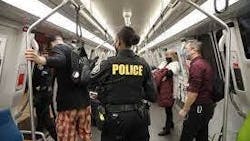FRA awards more than $2.4 billion in CRISI funding, FTA issues final rule to improve transit worker safety
The Federal Railroad Administration (FRA) awarded more than $2.4 billion in Consolidated Rail Infrastructure and Safety Improvements (CRISI) Program funding while the Federal Transit Administration (FTA) has issued a regulation to make transit workers safer by mandating standards to protect them while working on transit railways.
CRISI
The CRISI Program will fund 122 rail improvement projects in 41 states and Washington, D.C. FRA notes the projects will make rail safer, more reliable and more resilient, getting goods and people where they need to be quickly with fewer disruptions, lower shipping costs and less pollution.
According to the FRA, projects in this round of selections reflect the broad array of rail safety and service improvements eligible under this program, such as upgrading track, replacing or rehabilitating aging bridges, expanding rail connections at ports, adding modern locomotives to fleets and more. FRA notes the CRISI Program is the only federal grant program prioritizing smaller, short line railroads vital to the American economy and regional supply chains. The funding marks the most significant investment in American rail in more than 50 years.
“Today’s investments in our rail systems reflect the Biden-Harris Administration’s commitment to building a stronger, safer and more resilient transportation network,” said U.S. Department of Transportation Secretary Pete Buttigieg. “Through the Bipartisan Infrastructure Law, we’re funding rail infrastructure projects that create jobs and expand workforce development, reduce costs for consumers and directly benefit communities across the country. Each project advances a future where our supply chains are stronger, passenger rail more accessible and freight movement safer and more efficient.”
FRA notes federal funding will create new apprenticeship programs, expand training opportunities, establish partnerships with universities and advance innovative research.
“Under the Biden-Harris Administration and through the Bipartisan Infrastructure Law, FRA is investing more than ever in communities nationwide, reversing a half-century of federal underinvestment in America’s rail network and delivering the world-class rail our citizens deserve,” said FRA Administrator Amit Bose. “Today’s CRISI grants will enhance rail safety, better connect towns, cities and ports, introduce more environmentally friendly locomotives, support the current rail workforce and provide workforce development opportunities essential to the future of our industry and the national economy.”
Selected transit-related CRISI projects in this round include:
- In Illinois, more than $157 million will be invested in the Springfield Rail Improvements Project Final Usable Segment: Phase VIb: North Grand Ave. and IIIc: Multimodal Transportation Center Project, which will consolidate the Union Pacific and Norfolk Southern corridors into one multitrack corridor through the city and advance the efforts to provide a higher speed intercity passenger rail connection between St. Louis and Chicago. In addition to track improvements and new grade crossing separations, the project will also construct a multimodal transportation center to better connect public transportation options such as passenger rail, local bus service and intercity bus service.
- In partnership with Amtrak, more than $14 million will help implement a 36-month Mechanical Craft Workforce Development Apprenticeship Training Program to build a skilled mechanical craft workforce for Amtrak to maintain its fleet of equipment. The project will improve safety and service performance by providing Amtrak job opportunities and career paths in various mechanical crafts that are essential to maintaining service and improving efficiency. The apprenticeship program is a collaboration between Amtrak and several labor unions, with programs being offered in Beech Grove, Ind., Wilmington, Del., Washington, D.C., New York, Chicago and Los Angeles.
The full list of Fiscal Year 2023 and 2024 CRISI project selections can be found here.
New safety regulation
Under the final rule, to be published in the Federal Register on Oct. 31, rail transit agencies across the U.S. will have one year to create and receive State Safety Oversight Agency (SSOA) approval for a roadway worker protection program that is focused on employees who work on or around the tracks. Transit agencies are also required to implement comprehensive training for workers and ensure that unsafe acts and conditions are reported.
FTA notes unsafe practices and conditions place rail transit workers at risk of being killed or seriously injured. According to data reported in the National Transit Database, between Jan. 1, 2008, and June 30, 2024, 29 transit workers were killed and 144 were seriously injured performing track work. The National Transportation Safety Board and FTA’s Transit Advisory Committee for Safety both have recommended regulatory action to address rail transit worker safety.
"Today's action provides greater protection for workers on our nation’s subway, light rail and trolley systems. The final rule protects workers who access the rail tracks and promotes a safe work environment for all employees of rail transit systems," said FTA Deputy Administrator Veronica Vanterpool. "This final rule will save lives and ensure that our transit workers, who work tirelessly to maintain our rail transit systems nationwide, get home safely each day to their families and loved ones."
Under the final rule, rail transit agencies must:
- Adopt and implement an SSOA-approved Roadway Worker Protection Program (RWP) to improve worker safety, consistent with federal and state safety requirements. FRA notes "Roadway" is a term describing the area on and along the tracks.
- Establish minimum RWP program elements, including job safety briefings and lone worker protection.
- Create or update safety manuals to document RWP programs and include a track access guide.
- Establish a training program that addresses all transit workers responsible for on-track safety by position.
The final rule requires SSOAs to review and approve worker protection program elements, monitor implementation and conduct annual audits to ensure compliance.
In March 2024, the FTA issued the Rail Transit Roadway Worker Protection Notice of Proposed Rulemaking (NPRM) in the Federal Register, seeking public comment. In response to the NPRM, FTA received more than 7,000 comments.
FTA notes the final rule action builds upon previous steps by the Biden-Harris Administration to strengthen transit worker safety:
- 2021: Request for Information on Transit Worker Safety and the safety risk related to assaults on transit workers.
- 2022: Special Directives on Required Actions Regarding Transit Worker Assault issued to nine transit agencies, accounting for 79 percent of all assaults on transit workers.
- 2024: Updated the Public Transportation Agency Safety Plans regulation to strengthen transit worker safety, including new measures to assess the risk of assaults and involving joint labor-management safety committees to develop mitigations and strategies and issued a general directive on required actions regarding assaults on transit workers.
About the Author
Brandon Lewis
Associate Editor
Brandon Lewis is a recent graduate of Kent State University with a bachelor’s degree in journalism. Lewis is a former freelance editorial assistant at Vehicle Service Pros in Endeavor Business Media’s Vehicle Repair Group. Lewis brings his knowledge of web managing, copyediting and SEO practices to Mass Transit magazine as an associate editor. He is also a co-host of the Infrastructure Technology Podcast.

